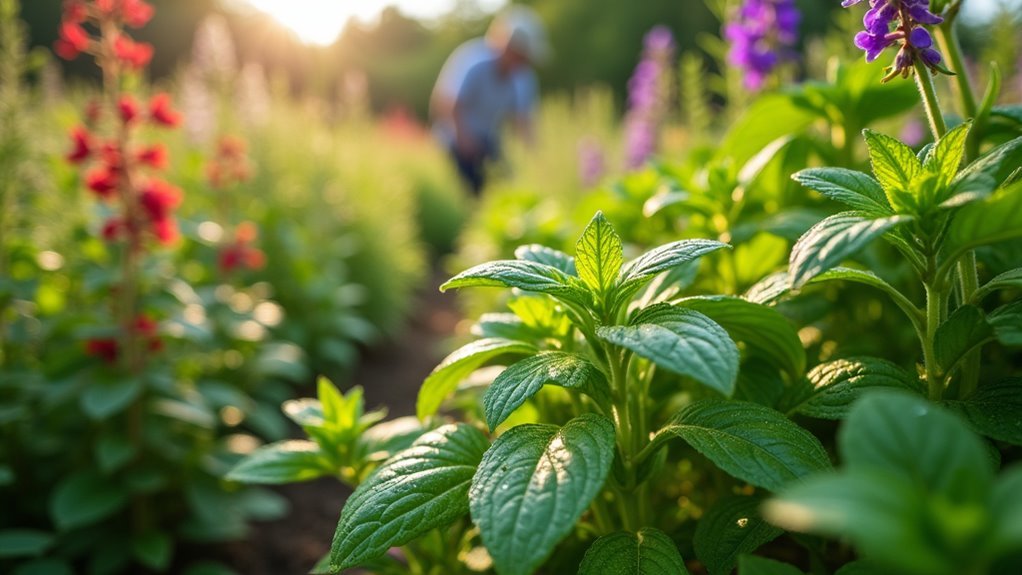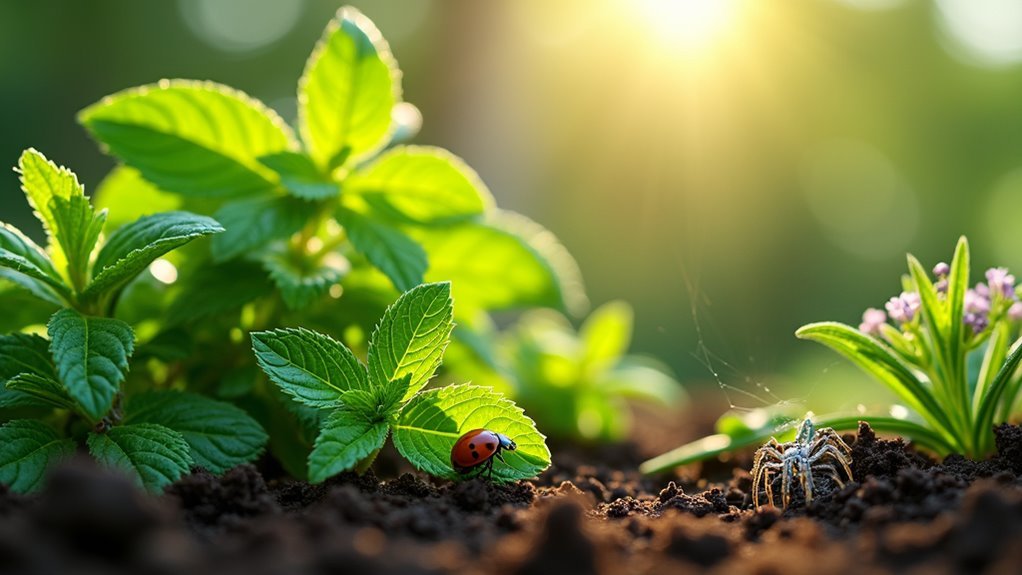You’ll find herbs repel garden pests through their volatile organic compounds that disrupt insects’ sensory systems and mask your plants’ attractive scents. Essential oils like citronellal and geraniol create chemical barriers that confuse pest navigation, while compounds such as cineole from herbs interfere with insect communication. These aromatic defenses work both above and below ground, as herb roots release protective compounds into soil. Understanding these natural mechanisms can transform your garden’s pest management approach.
The Science Behind Aromatic Pest Deterrents

Nature’s chemical warfare operates through your garden’s aromatic herbs, which release volatile organic compounds that act as invisible shields against unwanted pests.
These VOCs mask your host plants’ scents, making them undetectable to harmful insects. The chemical constituents in herbs like basil and mint disrupt insect sensory receptors, effectively deterring their approach.
Aromatic herbs deploy chemical camouflage, masking plant scents while disrupting insect sensory systems to create an effective natural defense barrier.
Compounds such as citronellal in lemongrass and geraniol in lavender create unpleasant odors that repel mosquitoes and other pests. Research shows catnip outperforms DEET in mosquito repulsion, proving botanical effectiveness.
When you plant aromatic herbs to repel garden pests, you’re simultaneously attracting beneficial insects that enhance natural pest control through predation, creating a balanced ecosystem.
Essential Oils as Natural Insect Repellents
You can harness essential oils from herbs like basil, lavender, and citronella as powerful natural insect repellents that outperform many synthetic alternatives.
These concentrated aromatic compounds work by disrupting insects’ sensory receptors and masking the scents that attract pests to your garden.
We’ll explore how these plant-derived defense mechanisms function and the most effective methods for applying them throughout your outdoor spaces.
Aromatic Compounds Deter Pests
When herbs release their essential oils into the air, they create a natural barrier that confuses and repels garden pests. These aromatic compounds act as a natural insecticide, disrupting insects’ sensory receptors and making it difficult for them to locate their target plants.
| Herb | Active Compound | Target Pests |
|---|---|---|
| Citronella | Citronellal | Mosquitoes |
| Lavender | Linalool, Camphor | Mosquitoes, Flies |
| Garlic | Sulfur Compounds | Aphids, Slugs |
You’ll find that herbs like basil and mint mask attractive scents that draw pests to your vegetables. Thyme and rosemary’s volatile compounds work similarly, preventing insects from finding host plants. When you’re companion planting, garlic’s strong sulfur scent doesn’t just repel mosquitoes—it protects neighboring vegetables while providing dual garden benefits.
Concentrated Plant Defense Mechanisms
Although many commercial repellents rely on synthetic chemicals, essential oils from common garden herbs offer a powerful and concentrated alternative that disrupts insects’ fundamental biological processes.
When you plant basil and lavender, their concentrated plant defense mechanisms release compounds that interfere directly with insect sensory receptors, making pests unable to locate or feed on nearby plants effectively.
These natural insecticides work more efficiently than you’d expect.
Catnip and citronella grass produce pest repellent compounds that outperform DEET in laboratory tests.
You’ll find that herbs like marigolds and chrysanthemums release specific chemicals that don’t just repel insects—they actually kill them.
This concentrated approach means you’re getting maximum protection from minimal space, creating an effective barrier that synthetic products struggle to match.
Application Methods For Gardens
Extracting and applying these powerful plant compounds requires specific techniques to maximize their pest-repelling effectiveness in your garden.
You’ll achieve ideal results by diluting essential oils from basil, mint, and lavender in water before spraying directly onto plant leaves. These natural application methods create aromatic barriers that repel mosquitoes, aphids, and other garden pests for several hours.
Citronella and eucalyptus oils prove particularly effective against flying insects when properly applied. You must reapply these organic gardening solutions regularly, especially after rainfall or heavy watering, to maintain their protective properties.
This natural approach reduces your dependence on synthetic pesticides while promoting healthier garden ecosystems through consistent, targeted applications.
Chemical Compounds That Disrupt Pest Behavior
You’ll find that essential oil components like cineole and camphor work by disrupting insect communication pathways and movement patterns.
These volatile compounds don’t just repel pests—they actively interfere with their ability to navigate and locate food sources.
Meanwhile, your herb plants’ roots secrete chemical compounds into the soil that create underground barriers against soil-dwelling pests like grubs and nematodes.
Essential Oil Components
When you crush a bay leaf between your fingers, the sharp, medicinal scent that emerges comes from eucalyptol, an essential oil compound that disrupts pest sensory receptors and sends insects searching for easier targets.
These essential oils work as natural insecticides through multiple mechanisms. Lemon balm’s citronellal confuses mosquitoes, while catnip’s nepetalactone proves more effective than DEET at repelling them.
Aromatic oils in basil and lavender don’t just repel pests directly—they mask your garden plants’ scents, making them harder for herbivorous insects to detect.
Meanwhile, sage and rosemary release cineole and camphor, compounds that scramble pest navigation systems.
You’ll find these essential oil components interfere with insects’ ability to locate food sources and mates, naturally reducing pest populations.
Root Chemical Secretions
While aerial parts of herbs release protective compounds into the air, the real chemical warfare happens underground where root systems continuously pump out defensive molecules.
Your aromatic herbs like mint and thyme emit volatile compounds through their roots that interfere with pests’ olfactory senses and navigation abilities.
Bay leaves release eucalyptol, which disrupts cockroach and weevil behavior, while garlic roots secrete sulfur compounds that repel insects and rodents.
Basil and sage root chemical secretions alter insect feeding patterns, making them less likely to infest nearby plants.
These underground defenses don’t just protect individual herbs—they create a protective zone that helps repel pests and reduces pest populations throughout your entire garden ecosystem.
How Strong Scents Mask Plant Attractants

Nature’s camouflage occurs when herbs release powerful aromatic compounds that overwhelm and mask the natural scents plants typically emit to attract pests.
When you plant basil and mint near vulnerable crops, their strong scent creates an olfactory shield that makes neighboring plants less detectable to aphids and mosquitoes.
The essential oils in lavender and rosemary interfere directly with insects’ olfactory receptors, reducing their ability to locate food sources.
You’ll find that herbs like garlic and thyme release volatile organic compounds creating potent aromas that confuse and repel pests.
This companion planting strategy works because aromatic herbs emit odors more powerful than your crops’ natural attractants, effectively camouflaging them.
Catnip demonstrates this principle exceptionally well, often outperforming chemical repellents like DEET in deterring various garden pests.
Root Chemistry and Soil-Based Protection
Below ground, herb roots create an invisible chemical defense network that extends protection far beyond what you can see above soil level. Root chemistry plays an essential role in pest control, with herbs releasing volatile organic compounds that inhibit harmful pests and pathogens. Garlic and onion roots contain sulfur compounds that specifically repel nematodes, while herb roots interact with soil microbiota to promote beneficial microorganisms that outcompete pests.
| Herb Type | Root Compounds | Pest Protection |
|---|---|---|
| Garlic/Onion | Sulfur compounds | Nematode repellent |
| Basil | Aromatic compounds | Disrupts pest sensors |
| Marigold | VOCs | Soil pathogen inhibitor |
| Mixed herbs | Various compounds | Enhanced nutrient uptake |
Aromatic herbs improve nutrient uptake for neighboring plants, creating stronger, more pest-resistant crops through enhanced growth and importance in healthier soil ecosystems.
Traditional Pest Control Methods Using Herbs

Building on these underground chemical networks, gardeners have developed time-tested methods that harness herbs’ natural pest-fighting properties above ground.
You’ll find that strategically placing aromatic herbs like basil and mint creates protective barriers around vulnerable plants. These herbs release compounds that confuse and repel mosquitoes, flies, and aphids without harmful chemicals.
When you companion plant garlic and rosemary near vegetables, you’re not just deterring pests—you’re enhancing neighboring plants’ growth and flavor.
Marigolds release pyrethrum, while chrysanthemums produce thiophene, both acting as natural pest deterrents. Catnip proves more effective than DEET against mosquitoes.
Thyme and sage disrupt insect sensory receptors, making them excellent natural pest control choices that promote garden biodiversity.
Comparing Natural Vs Chemical Pesticide Effectiveness
When you weigh natural versus chemical pesticide options, you’ll discover that herb-based solutions offer compelling advantages beyond simple pest control.
Natural pesticides like pyrethrin from chrysanthemums prove effective at repelling mosquitoes and roaches without toxic side effects. You’ll find that herbs such as basil and mint create balanced ecosystems by deterring garden pests while attracting beneficial insects.
Key Benefits of Organic Pest Control:
- Sustained effectiveness – herbs maintain potency without causing pest resistance
- Environmental protection – considerably lower carbon footprint than chemical alternatives
- Soil enhancement – improves soil health and promotes biodiversity
- Dual-purpose plants – repel harmful pests while attracting beneficial insects
- Chemical-free safety – eliminates health risks associated with synthetic compounds
Unlike chemical pesticides that degrade soil quality and disrupt ecosystems, herb-based solutions strengthen your garden’s natural defenses.
Specific Herbs That Target Common Garden Pests
Strategic herb selection transforms your garden into a natural fortress against common pests, with each plant serving as a targeted defense system.
You’ll find garlic near garden edges creates an effective barrier against aphids, mosquitoes, and rabbits through its potent scent.
Plant marigolds near vulnerable crops to release thiophene compounds that repel nematodes, aphids, and mosquitoes naturally.
Thyme’s aromatic oils specifically target cabbage worms and whiteflies, making it essential for protecting cabbage and tomato plants.
Basil serves double duty by repelling flies and mosquitoes while enhancing tomato growth and flavor when planted nearby.
Chrysanthemums contain natural pyrethrin, effectively deterring roaches, ants, and fleas around garden perimeters, providing extensive protection for your entire growing space.
Companion Planting Strategies for Maximum Protection
Effective companion planting goes beyond simply choosing the right herbs—it requires careful positioning and plant combinations that amplify each herb’s protective qualities.
You’ll maximize protection by strategically placing aromatic herbs like basil and marigolds around vulnerable vegetables, creating natural barriers that repel pests through concentrated scents.
Plant thyme and mint near crops susceptible to aphids, while positioning garlic and rosemary to confuse insects with their strong odors.
- Plant basil directly beside tomatoes to repel aphids and hornworms
- Create borders with marigolds around vegetable beds for extensive protection
- Interplant sage and dill to disrupt pest life cycles effectively
- Use mint as perimeter plantings to deter cabbage worms and beetles
- Position rosemary near entrances to confuse incoming insects
This strategic companion planting approach harnesses each herb’s pest-repelling properties while encouraging beneficial insects.
Seasonal Application of Herbal Pest Control
You’ll maximize your garden’s pest protection by timing herb plantings strategically throughout the year.
Spring offers prime opportunities to establish defensive barriers with garlic, chives, basil, and marigolds before pest populations surge.
Winter preparations with hardy herbs like thyme and sage create lasting protection that carries through the dormant season.
Spring Planting Strategies
When spring arrives and soil temperatures begin to warm, you’ll want to establish your herbal pest control foundation before garden pests emerge from winter dormancy. This proactive approach guarantees your pest-repelling herbs develop strong root systems and aromatic compounds that’ll deter insects throughout the growing season.
Your diverse herb planting strategy should focus on companion herbs that provide multiple benefits. Plant garlic and chives in early spring to maximize their protective qualities before pests become active. Incorporate basil and mint alongside vegetables for enhanced aromatherapy-based pest control.
- Plant marigolds and thyme together for natural insect repellent and pollinator attraction.
- Establish garlic and chives early for maximum protective development.
- Combine basil with tomatoes and peppers for aphid control.
- Space mint strategically to deter mosquitoes without spreading aggressively.
- Create herb clusters throughout garden beds for thorough pest protection.
Winter Protection Methods
As temperatures drop and your growing season winds down, winter protection methods become your next line of defense against pests that overwinter in garden soil and debris.
Plant hardy herbs like thyme and sage that’ll survive cold temperatures while their strong fragrance continues to deter pests through winter months.
Apply crushed garlic or garlic oil around garden beds in late fall to repel pests seeking soil shelter.
Create protective barriers using crushed herbs or herb-infused oils over beds to guard soil while promoting beneficial insect habitats.
Incorporate rosemary and lavender into winter garden designs for aesthetic appeal and natural pest deterrence.
Use dried herbs like bay leaves or mint as insecticide dust to protect stored produce from weevils and moths throughout winter storage.
Benefits for Beneficial Insects and Pollinators
While many gardeners focus on herbs’ pest-repelling properties, these aromatic plants offer equally important benefits by attracting and supporting beneficial insects that’ll transform your garden into a thriving ecosystem.
When you plant herbs like basil, dill, and parsley, you’re creating habitats that welcome bees, ladybugs, and lacewings. These beneficial insects provide essential pollination services while naturally controlling pest populations. The strong aromas from your herbs establish a diverse environment that encourages predatory insects to stay and work.
- Herbs attract pollinators like bees and butterflies for improved crop yields
- Beneficial insects reduce pest populations naturally without chemicals
- Increased biodiversity strengthens soil health and plant resilience
- Thyme and marigolds repel pests while attracting helpful predators
- Sustainable gardening practices eliminate synthetic pesticide dependency
Creating Barriers Through Strategic Herb Placement
You can transform your garden into a fortress against pests by positioning specific herbs at strategic points throughout your growing space.
Start with perimeter planting defense strategies that use strong-scented herbs like garlic and chives to create an outer protective ring around your garden beds.
Build upon this foundation with layered herb protection zones and concentrated aromatic plant clusters that work together to repel unwanted insects while maintaining your garden’s natural balance.
Perimeter Planting Defense Strategies
When you establish a perimeter defense using aromatic herbs, you’re creating a natural fortress that shields your garden from destructive pests. Plant near your garden’s edges with lavender, rosemary, and mint to keep bugs away through their powerful scents. These aromatic barriers make it difficult for harmful insects to penetrate your growing space.
Strategic placement maximizes protection when you combine different herbs targeting various pests. Marigolds serve as a great companion to chrysanthemums, effectively keeping pests at bay while attracting beneficial pollinators.
Garlic and basil mask neighboring plants’ scents, confusing pest navigation systems.
- Plant lavender and rosemary along garden borders for maximum scent coverage
- Position marigolds at entry points to repel aphids and mosquitoes
- Use mint strategically to create natural pest barriers
- Combine multiple herbs for enhanced protective effects
- Establish aromatic zones that support beneficial insects
Layered Herb Protection Zones
Beyond establishing a single perimeter defense, layered herb protection zones create multiple defensive barriers throughout your garden by strategically positioning complementary pest-repelling herbs at varying distances from your vulnerable crops.
You’ll maximize protection by placing marigolds around vegetable beds to deter nematodes and aphids, while positioning basil and mint nearby to repel flies and mosquitoes.
Plant thyme and rosemary close to leafy greens and tomatoes—their aromatic oils disrupt pest pathways effectively.
Group garlic and chives together for enhanced multi-layered defense against garden pests.
This strategic arrangement doesn’t just protect your crops; it attracts beneficial insects and pollinators.
Your layered approach creates a balanced ecosystem where pest pressures decrease naturally while garden yields increase substantially.
Concentrated Aromatic Plant Clusters
While individual herbs provide modest pest deterrence, concentrated aromatic plant clusters amplify their defensive capabilities exponentially by creating potent scent barriers that overwhelm pest sensory systems.
When you group aromatic herbs like basil, mint, and lavender together, their combined fragrances create a natural barrier that’s far more effective than scattered plantings. This strategic clustering disrupts insect sensory receptors, making it nearly impossible for pests to locate their target plants.
Interplanting herbs with vegetables maximizes this protective effect, as multiple herb varieties working together produce stronger repellent compounds.
- Plant basil, mint, and lavender in tight clusters around vulnerable vegetables
- Group rosemary and thyme together to deter pests seeking nearby host plants
- Create marigold borders that release nematode-repelling compounds
- Position herb clusters at garden entry points as defensive barriers
- Combine multiple aromatic herbs to target different pest species simultaneously
Long-Term Garden Ecosystem Health
As you incorporate herbs throughout your garden, you’re building a resilient ecosystem that naturally maintains pest balance for years to come. Through companion planting, you’ll create diverse habitats that support beneficial insects while deterring harmful pests. This strategic approach enhances soil health and promotes biodiversity that strengthens your garden’s natural defenses.
| Ecosystem Benefits | Short-Term Impact | Long-Term Results |
|---|---|---|
| Beneficial insects | Immediate pest control | Self-sustaining balance |
| Soil enrichment | Nutrient availability | Improved plant resilience |
| Biodiversity | Reduced pest outbreaks | Stable ecosystem |
| Natural compounds | Direct pest deterrence | Enhanced soil chemistry |
Your herb-enriched garden becomes increasingly self-sufficient as these plants establish themselves. The aromatic compounds from basil, thyme, garlic, and marigolds create lasting protective barriers while continuously improving soil conditions, ensuring your garden thrives with minimal intervention.
Practical Implementation Tips for Home Gardeners
When implementing herbs for pest control, you’ll want to start with strategic placement that maximizes their natural properties. Focus on positioning aromatic herbs like mint, basil, and thyme near vulnerable plants where they’ll effectively repel pests through their natural essential oils.
- Plant companion herbs directly alongside vegetables rather than in separate areas to create protective barriers against aphids and whiteflies.
- Crush fresh herb leaves regularly on basil and catnip plants to release stronger pest-deterring compounds throughout the growing season.
- Position lavender and rosemary near entrances to your garden and home for maximum mosquito and fly deterrence.
- Create perimeter plantings with garlic around garden borders to establish broad pest protection zones.
- Combine marigolds with nasturtiums among vegetables to attract beneficial insects while deterring harmful nematodes.
These practical tips guarantee your aromatic herbs work efficiently as natural pest control solutions.
Frequently Asked Questions
Do Herbs Keep Bugs Away?
Yes, you’ll find herbs effectively keep bugs away through their natural aromatic compounds. You can plant basil, mint, catnip, and lavender around your garden to repel mosquitoes, flies, and aphids naturally.
What Are the Benefits of Controlling Garden Pests Naturally?
You’ll protect beneficial insects while reducing chemical runoff into waterways. Natural pest control prevents resistance development, enhances soil health, and creates a balanced ecosystem that sustains itself long-term without synthetic interventions.
What Plants Repel Insects in Gardens?
You can plant basil, mint, lavender, garlic, marigolds, catnip, thyme, and rosemary to repel insects. These plants emit strong scents that deter mosquitoes, flies, aphids, and nematodes while attracting beneficial insects.
Does Growing Garlic Keep Bugs Away?
Yes, you’ll find that growing garlic effectively keeps bugs away from your garden. Its sulfur compounds create strong odors that deter aphids, mosquitoes, beetles, and cabbage loopers while attracting beneficial pollinators.
In Summary
You’ve discovered how herbs create a natural defense system in your garden through essential oils, chemical compounds, and strategic scent masking. By understanding these mechanisms, you can position aromatic plants to disrupt pest behavior while protecting beneficial insects. You’ll build a healthier garden ecosystem that’s self-sustaining and environmentally friendly. Start implementing these herb-based strategies today, and you’ll see fewer pests without relying on harmful chemicals that damage your soil and plants.





Leave a Reply